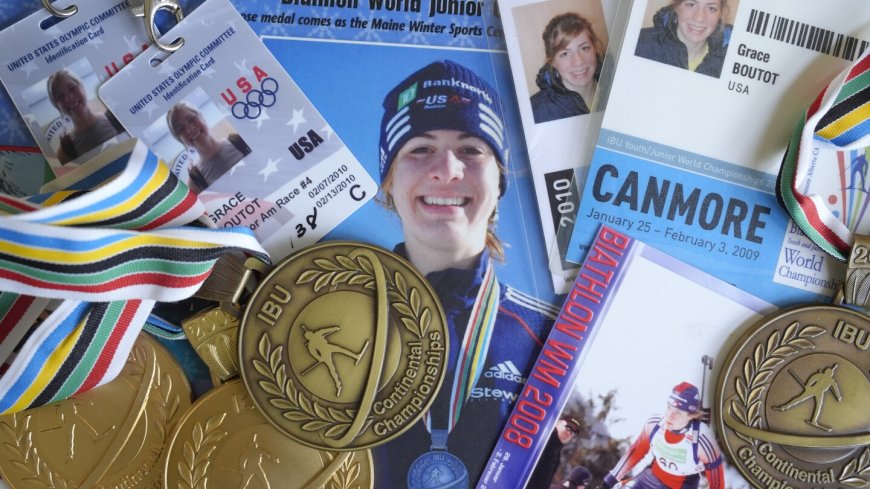US Olympic and Paralympic officials put coach on leave after AP reports sexual abuse allegations
The U.S. Olympic & Paralympic Committee placed an employee on administrative leave Thursday after The Associated Press reported that one of its coaches was accused of sexually abusing a young biathlete, causing her so much distress that she attempted suicide.Rocky Harris, USOPC chief of sport and athlete services, sent an email to U.S. Biathlon national team members to address the “concerning allegations of abuse" raised by several biathletes in the AP report.“We want to commend these athletes for their immense courage and strength in coming forward," the email said. “Effective immediately, we have placed a USOPC staff member on administrative leave pending an internal investigation.”Harris did not name the employee, but Gary Colliander was the only USOPC coach named in the AP report. Jon Mason, a USOPC spokesperson, told the AP that no additional information would be released while the inquiry is underway.Hub peek embed (apf-sports) - Compressed layout (automatic embed) “While we are currently in the process of gathering all the necessary information surrounding these complaints, we want to emphasize that abuse and misconduct have no place in our community," said the email, also sent to the AP.Grace Boutot told the AP that after Colliander began coaching her when she was 15, he gave her a lot of attention, including long hugs and inappropriate touching. The conduct escalated after she turned 18 to “kissing, sexual fondling and oral sex,” according to a treatment summary by therapist Jacqueline Pauli-Ritz, shared with the AP.The AP generally does not identify victims of sexual abuse except in cases where they publicly identify themselves or share their stories openly.Boutot said she begged Colliander to stop but he ignored her. She said he warned her against telling anyone, saying his life would be ruined and her biathlon career would end. In September 2010, Pauli-Ritz contacted Colliander and told him Boutot was suffering from major depression and post-traumatic stress disorder and he should stop coaching her, the treatment summary said.“He did not do this until after the suicide attempt,” Pauli-Ritz wrote, referring to Boutot’s Oct. 7, 2010, overdose on antidepressants while at a training camp in Soldier Hollow, Utah. She was found by a teammate and hospitalized.The next day, Colliander resigned his position with the Maine Winter Sports Center. He was hired in December 2016 by the U.S. Paralympic team, where he is associate director of high performance for U.S. Paralympics Nordic Skiing.Colliander did not immediately respond to email and phone messages seeking comment.Boutot, 33, said she's glad the U.S. Olympic committee is taking action, but is “incredibility disappointed” that U.S. Biathlon has failed to do the same.“The true origin of the misogynistic culture lies with U.S. Biathlon," she said. “The silence is stunning, to be honest.”U.S. Biathlon CEO Jack Gierhart sent an email to the AP and U.S. Biathlon members late Thursday saying the allegations in the AP report were troubling. “We are deeply concerned about the experiences of the athletes mentioned. To all of you, I want to reaffirm our commitment to athlete safety,” it said.Boutot was among a half-dozen Olympians and other biathletes who came forward after the AP reported earlier this year that Olympian Joanne Reid was sexually abused and harassed for years, according to findings by the U.S. Center for SafeSport, created to investigate sex-abuse allegations in Olympic sports in the aftermath of the Larry Nassar U.S. Gymnastics scandal.They described a culture of abuse dating back to the 1990s, and said that while the men involved climbed the ranks of the sport, they faced retaliation that forced them to end their racing careers early.___EDITOR’S NOTE — This story includes discussion of suicide. If you or someone you know needs help, the national suicide and crisis lifeline in the U.S. is available by calling or texting 988. There is also an online chat at 988lifeline.org

The U.S. Olympic & Paralympic Committee placed an employee on administrative leave Thursday after The Associated Press reported that one of its coaches was accused of sexually abusing a young biathlete, causing her so much distress that she attempted suicide.
Rocky Harris, USOPC chief of sport and athlete services, sent an email to U.S. Biathlon national team members to address the “concerning allegations of abuse" raised by several biathletes in the AP report.
“We want to commend these athletes for their immense courage and strength in coming forward," the email said. “Effective immediately, we have placed a USOPC staff member on administrative leave pending an internal investigation.”
Harris did not name the employee, but Gary Colliander was the only USOPC coach named in the AP report. Jon Mason, a USOPC spokesperson, told the AP that no additional information would be released while the inquiry is underway.
“While we are currently in the process of gathering all the necessary information surrounding these complaints, we want to emphasize that abuse and misconduct have no place in our community," said the email, also sent to the AP.
Grace Boutot told the AP that after Colliander began coaching her when she was 15, he gave her a lot of attention, including long hugs and inappropriate touching. The conduct escalated after she turned 18 to “kissing, sexual fondling and oral sex,” according to a treatment summary by therapist Jacqueline Pauli-Ritz, shared with the AP.
The AP generally does not identify victims of sexual abuse except in cases where they publicly identify themselves or share their stories openly.
Boutot said she begged Colliander to stop but he ignored her. She said he warned her against telling anyone, saying his life would be ruined and her biathlon career would end.
In September 2010, Pauli-Ritz contacted Colliander and told him Boutot was suffering from major depression and post-traumatic stress disorder and he should stop coaching her, the treatment summary said.
“He did not do this until after the suicide attempt,” Pauli-Ritz wrote, referring to Boutot’s Oct. 7, 2010, overdose on antidepressants while at a training camp in Soldier Hollow, Utah. She was found by a teammate and hospitalized.
The next day, Colliander resigned his position with the Maine Winter Sports Center. He was hired in December 2016 by the U.S. Paralympic team, where he is associate director of high performance for U.S. Paralympics Nordic Skiing.
Colliander did not immediately respond to email and phone messages seeking comment.
Boutot, 33, said she's glad the U.S. Olympic committee is taking action, but is “incredibility disappointed” that U.S. Biathlon has failed to do the same.
“The true origin of the misogynistic culture lies with U.S. Biathlon," she said. “The silence is stunning, to be honest.”
U.S. Biathlon CEO Jack Gierhart sent an email to the AP and U.S. Biathlon members late Thursday saying the allegations in the AP report were troubling. “We are deeply concerned about the experiences of the athletes mentioned. To all of you, I want to reaffirm our commitment to athlete safety,” it said.
Boutot was among a half-dozen Olympians and other biathletes who came forward after the AP reported earlier this year that Olympian Joanne Reid was sexually abused and harassed for years, according to findings by the U.S. Center for SafeSport, created to investigate sex-abuse allegations in Olympic sports in the aftermath of the Larry Nassar U.S. Gymnastics scandal.
They described a culture of abuse dating back to the 1990s, and said that while the men involved climbed the ranks of the sport, they faced retaliation that forced them to end their racing careers early.
___
EDITOR’S NOTE — This story includes discussion of suicide. If you or someone you know needs help, the national suicide and crisis lifeline in the U.S. is available by calling or texting 988. There is also an online chat at 988lifeline.org


























































